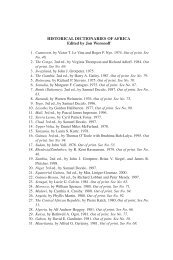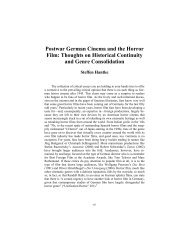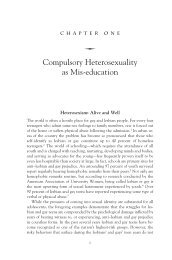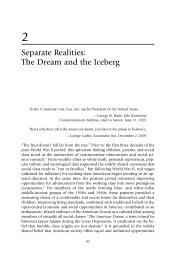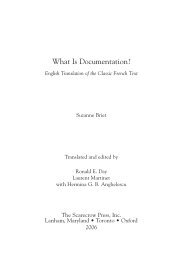Historical Dictionary of Western Sahara Third ... - Scarecrow Press
Historical Dictionary of Western Sahara Third ... - Scarecrow Press
Historical Dictionary of Western Sahara Third ... - Scarecrow Press
Create successful ePaper yourself
Turn your PDF publications into a flip-book with our unique Google optimized e-Paper software.
lxiv • INTRODUCTION<br />
THE FUTURE<br />
By early 2006, the situation in <strong>Western</strong> <strong>Sahara</strong> looked decidedly unpromising.<br />
With the UN Identification Commission out <strong>of</strong> business and<br />
its files transported to safe storage in Geneva, MINURSO’s only function<br />
was to supervise the so-far intact cease-fire and to carry out a series<br />
<strong>of</strong> “confidence-building” measures in the territory, including reciprocal<br />
visits by <strong>Sahara</strong>wi family members on both sides <strong>of</strong> the<br />
Morocco-Polisario divide who had not seen each other since the outbreak<br />
<strong>of</strong> the <strong>Sahara</strong>n war in 1975.<br />
In addition, the diplomacy surrounding the territory was moving at an<br />
even more glacial pace in the first half <strong>of</strong> 2004, due not only to the<br />
many competing demands on the time and resources <strong>of</strong> the UN but also<br />
to the continued reluctance <strong>of</strong> France and the United States to put any<br />
real political pressure on Morocco to induce it to allow self-determination;<br />
both countries had long seen Morocco as a key Arab and African<br />
ally, either for historical reasons (as with Paris) or for either Cold War<br />
or anti-Islamic fundamentalist strategic reasons. But there were a few<br />
small signs that Morocco’s star was dimming.<br />
The new régime <strong>of</strong> King Mohamed VI had not proven itself the<br />
diplomatic equal <strong>of</strong> Hassan II’s government. Having allowed itself to be<br />
outfoxed by Algeria and the Polisario Front over the second peace plan<br />
authored by James Baker, Rabat seemed blind to the possibility that accepting<br />
the plan might allow it to s<strong>of</strong>ten its heavy-handed reputation on<br />
the <strong>Western</strong> <strong>Sahara</strong> problem. Moreover, it was joined in its intransigence<br />
most enthusiastically by French President Jacques Chirac, who<br />
pointedly called <strong>Western</strong> <strong>Sahara</strong> “the southern provinces <strong>of</strong> Morocco”<br />
during a 2001 state visit to Morocco. But France’s backing could not<br />
provide much comfort for King Mohamed, as Paris was in disfavor with<br />
the American administration led by President George W. Bush owing to<br />
its opposition to the U.S.-led invasion <strong>of</strong> Iraq in 2003. Morocco also<br />
rashly induced a military confrontation in July 2002 with Spanish Prime<br />
Minister José María Aznar when it occupied the contested islet <strong>of</strong> Perejil<br />
in the Mediterranean, obliging Aznar (who had previously been lukewarm<br />
toward Morocco on other issues), to forcibly, albeit bloodlessly,<br />
eject Moroccan forces from the uninhabited territory several days later.<br />
Aznar’s government, to make things somewhat worse for King Mohamed,<br />
was closely aligned with the Bush administration over Iraq and




